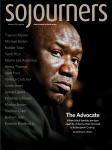OUR MOUNTING ANXIETIES are confronted in the psalm for the final Sunday of this month. Not the wear and tear of personal difficulties, but stress, fear, and exasperation at the flourishing of injustice, denial, mendacity, and exploitation. All exacerbated by the frenzied input of the media in which we are saturated. The psalmist speaks: Be still before the Lord and wait patiently. Do not fret over those who prosper, who succeed in evil schemes (see Psalm 37). The psalms do not prescribe withdrawal, tranquilizers, or techniques of self-calming, but stillness “before the Lord.”
Those who are emotionally tortured by the enormity of the damage being done to humanity by so many powerful people need a renewed spirituality for activists that derives its strength from a deepened intimacy with God. The psalmist shows the frankest awareness of the howling frustration that wreaks havoc with our physical and mental health and shreds our emotional availability to one another, and yet is certain that the only ultimate antidote is personal exposure to the joy and tenderness of God. “Take delight in the Lord, and you will be given the desires of your heart” (verse 4). Those who listen closely will hear echoes of this in other readings. Very tellingly Jeremiah urges, “Blessed are those who trust in the Lord, whose trust is the Lord” (17:7). Trusting in God, but more than that, experiencing the indwelling of God in our hearts and the pulsing trust from that heart living in us.
[ February 3 ]
No Experience Needed
Jeremiah 1:4-10; Psalm 71:1-6; 1 Corinthians 13:1-13; Luke 4:21-30
IT IS EASY to overuse the word “prophetic” and tread it flat. We need scriptures like these to restore authenticity to our language about prophetic calling and ministry. Jeremiah recounts his experience of God’s call to be a prophet when he was still a youth. He resisted the call because he was still embedded in a culture weighted toward the kind of authority supposedly earned by years of experience. But a prophet must be disembedded from her culture to address that culture with God’s authority. And “experience” is often just a code word for initiation into the values of an unjust order. God challenges the normal requirement of experience, placing the prophet solely under the authority of God’s own promise. No experience necessary! I am reminded of God’s mordant skepticism toward society’s conventional valuation of experience in Charles Péguy’s great poem “The Mystery of the Holy Innocents.” Péguy writes: “As for what you call experience, your experience, I call it waste, diminution, decrease, the loss of hope.”
In Jesus’ confrontation at Nazareth with those who knew him only too well, he quotes a bit of folk wisdom: “No prophet is accepted in the prophet’s hometown.” By definition, a prophet is an outsider: She thinks outside the categories that form the common-sense worldview. And so she is drawn to the stranger and those on the fringe who are more likely to be open to acts of God invisible to conventional eyes. Jesus then scandalizes his former playmates by mentioning that the only successes Elijah and Elisha had at healing were with pagan foreigners. The congregation instantly changes into a lynch mob from which Jesus narrowly escapes.
Paul’s praise of love in 1 Corinthians 13 challenges our prophetic practice: “If I speak in the tongues of mortals and of angels, but do not have love, I am a noisy gong or a clanging symbol.” Prophets take their stand where God’s incandescent holy love meets human resistance. It is a perilous place where prophetic actions can insidiously draw on the dark energy of hostility and self-righteousness, and utterly forfeit their authenticity.
[ February 10 ]
Net Fishing
Isaiah 6:1-13; Psalm 138; 1 Corinthians 15:1-11; Luke 5:1-11
IN THE HEBREW scriptures, the expression “seeing God’s face” usually refers to a transcendent experience of divine presence that could overcome worshipers during the liturgies of the Jerusalem temple. This week we hear Isaiah telling of such an experience in which he accepted God’s call to be a prophet. Aware of his foul mouth, and the foul mouths of his compatriots, Isaiah is horrified by God’s call, but a seraph is dispatched from the throne bearing a burning coal to scorch Isaiah’s mouth, cauterizing its infection. Perhaps this searing image will have a fresh intensity for us this year in which we feel a mounting horror at the contempt for truth being cultivated by so many of our political leaders. Lies, propaganda, misinformation—our social world is increasingly riddled with abusive falsity. Now it is impossible to represent God in any way without undergoing a searing operation by the divine physician to restore our passion for truth-telling and heal our complicity in a culture of lies. How would our worship services need to change to be the setting for the kind of operation that Isaiah underwent?
In Luke’s gospel, Jesus abruptly announces to Simon and the sons of Zebedee that from now on they would be catching women, men, and children, not fish. How imaginatively vivid is this image for many of us? Often images fail to resonate unless we have physical memories associated with them: adding yeast to dough, sowing seeds, casting nets. I go fishing with nets off the beach at Waikanae in New Zealand every year, chatting with Māori families as they work alongside my own family, everyone looking forward to their day’s catch. It is a very communal scene: all hands on deck, everyone involved, some wading far and deep, others untangling and pulling. The felt sense of Jesus’ words ran through me a few months ago at my wedding when I looked out over a sea of guests; so many whom God had ushered into my nets, one way or another, during fifty years of ordained ministry! What abundance! How can we listen to Jesus’ words about being fishers of people without tears of gratitude?
[ February 17 ]
Wisdom of ‘Woe’
Jeremiah 17:5-10; Psalm 1; 1 Corinthians 15:12-20; Luke 6:17-26
LUKE'S VERSION of the beatitudes, given by Jesus standing “on a level place,” have a strong claim to be closer to the original than Matthew’s more familiar Sermon on the Mount version. In Luke, the poor whom Jesus congratulates are the exploited and the indigent. Matthew, however, has massaged poverty into a spiritual category: “Blessed are the poor in spirit.” This made it impossible for him to present the other side of Jesus’ pronouncement in which (according to Luke) he declares, “Woe to you who are rich … woe to you are full … woe to you who are laughing now.” Matthew could hardly spiritualize this—“woe to you who are rich in spirit” just wouldn’t work. So Matthew dropped the “woes.” We are in debt to Luke for faithfully presenting the other side of Jesus’ beatitudes. God’s passion to redress the plight of the struggling poor necessarily involves judgment on those who ruthlessly corner the earth’s resources—God’s gifts for the support of all—for their own power and unjust wealth. There is no rest for the Spirit of God until a just sharing levels the field. No wonder Matthew’s version has been more popular in the church, muffling the radical implications of God’s promise to level the field.
In 1 Corinthians, Paul is contending with another symptom of the risk of spiritualizing the good news. Some were asserting that no resurrection for ourselves was to be expected, and we notice in other places in the New Testament this tendency to locate resurrection, Jesus’ and ours, on an immaterial spiritual plane as a matter of the soul’s destiny, rather than a recreative act of God that transforms and renews bodily, historical reality. Some “have swerved from the truth by claiming that the resurrection has already taken place” (2 Timothy 2:18). Paul insists on the unbreakable link between the actual raising of Jesus on the third day and the ultimate consummation that the church’s creed robustly calls “the resurrection of the body.”
[ February 24 ]
In the Family Business
Genesis 45:3-11, 15; Psalm 37:1-11, 39-40; 1 Corinthians 15:35-38, 42-50; Luke 6:27-38
“BUT LOVE YOUR enemies, do good, and lend, expecting nothing in return. Your reward will be great, and you will be the children of the Most High; for he is kind to the ungrateful and the wicked” (Luke 6:35). This week we go right to the radical core of the ethics of the reign of God, the onset of God’s future, learning from Jesus what it means to live under the authority of God, not the mores of the past. Unless we drill down to this core, our understanding of what it means to be a child of God will be merely conventional and thin. In one sense we are all children of God already just by being human and being born with the stamp of the image and likeness of God in our personhood. But in another sense, we must become God’s offspring to authenticate our right to this identity by demonstrating the family likeness and character in action.
In today’s gospel passage we are urged to be children of God by working, so to speak, in the family business. In the society in which Jesus lived, most production was domestic, in family businesses where even little children were hard at work. It is still this way with many societies today, however much the industrial model is spreading. And so it would have been for Jesus, the little apprentice, alongside his sisters and brothers in Joseph’s construction business. The Holy One’s family business is reconciliation, risky solidarity, and love that is unconditional and generous—a business that is indifferent to profit or even breaking even. What a strange business model! But it is God’s—and if we are to be part of the company in “God and Family: Distributors of Unconditional Love,” then we must get down to business, and demonstrate our resemblance to our Creator.
“Preaching the Word,” Sojourners’ online resource for sermon preparation and Bible study, is available at sojo.net/ptw.

Got something to say about what you're reading? We value your feedback!







